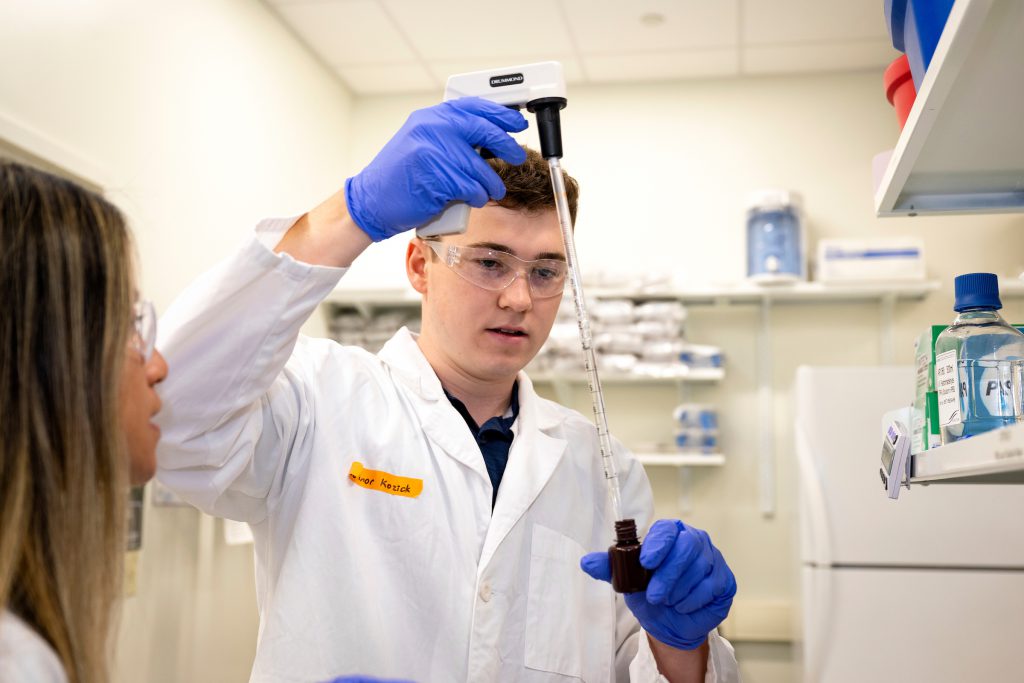Contact:
Mike Ferlazzo
570-577-3212
570-238-6266 (c)
mike.ferlazzo@bucknell.edu
LEWISBURG, Pa. (July 25, 2023) – Research at Bucknell doesn’t take a summer break. More than 250 Bucknell students are spending their summer conducting experiments, delving into archives and exploring creative questions to make meaningful discoveries.
Bucknell’s Office of Undergraduate Fellowships and Research connects students with programs both within the University and with external organizations that advance what they’ve learned in the classroom and enable them to develop new skill sets that will benefit their future studies and careers.
Two such programs – Bucknell’s Emerging Scholars Summer Research, Scholarship & Creavity Program and the Bucknell Program for Undergraduate Research – create and nurture a collaborative community of research scholars on campus for eight to 10 weeks each summer. Bucknell removes financial barriers to participation by providing free campus housing and a stipend to cover students’ living expenses so students can fully immerse themselves in their research.
“Bucknell makes a significant investment in supporting undergraduate research and ensuring that there is support for students’ scholarly interests,” says Margaret Marr, director of Undergraduate Fellowships and Research. “Students develop meaningful, lifelong relationships with their research mentors while learning valuable, transferable skills, like teamwork and communication.”
Throughout the summer, the Office of Undergraduate Fellowships and Research organizes weekly gatherings for researchers and mentors. These community-building events enhance students’ social networks while demonstrating the value of interdisciplinary collaboration. “Having an opportunity to discuss their work with a person in a different discipline can bring a new perspective and spark an idea that helps to advance their work,” Marr says. “They are investigating things others have never investigated before, which means they’ll inevitably encounter obstacles they’ll need to overcome. Every employer I’ve ever met likes to hire problem-solvers.”
Meet one of these problem-solvers.
Connor Kozick ’26 is one of seven biomedical engineering majors investigating the effectiveness of ultrasound as a treatment for chronic wounds. The team’s research mentor, Professor Olivia Boerman, biomedical engineering, uncovered in her own research as a doctoral student that a weekly 15-minute ultrasound treatment can significantly reduce the healing time of diabetic foot and venous leg ulcers – from 12 months to four weeks.
How? That’s where Kozick and his labmates come in. While Boerman and her research team showed the effectiveness of ultrasound treatment in human trials, to get therapeutic ultrasound approved as a commercialized device – providing a more affordable, effective alternative to medications and invasive procedures – the medical community needs to understand exactly how it works.
To achieve that goal, each of Boerman’s student researchers is working on a piece of the puzzle. For his part, Kozick is investigating the role of endothelial cells, which line the inside of blood vessels and are known to contribute to the body’s healing process. These cells are also known to be particularly sensitive to mechanical stimuli like ultrasounds.
“I’m looking to see if endothelial cells exposed to ultrasound secrete a specific protein that contributes to the generation of blood vessels,” says Kozick, who is from Danville, Pa. “If we see an increase of this protein, it could indicate that the ultrasound promotes the growth of blood vessels, which could be responsible for the advanced healing – or not. Even if we show that it’s not a factor, that’s valuable to know because it eliminates it as a possibility.”
Kozick, who is participating in Bucknell’s Emerging Scholars program, says it’s been a gratifying experience. “I feel like I’m doing something that carries weight,” he says, “not just as a resume builder, but that I’m contributing to something that can help others and benefit society.”
-30-
To download full image, right-click and choose “save image as”

Photo credit: Emily Paine, Bucknell University.

